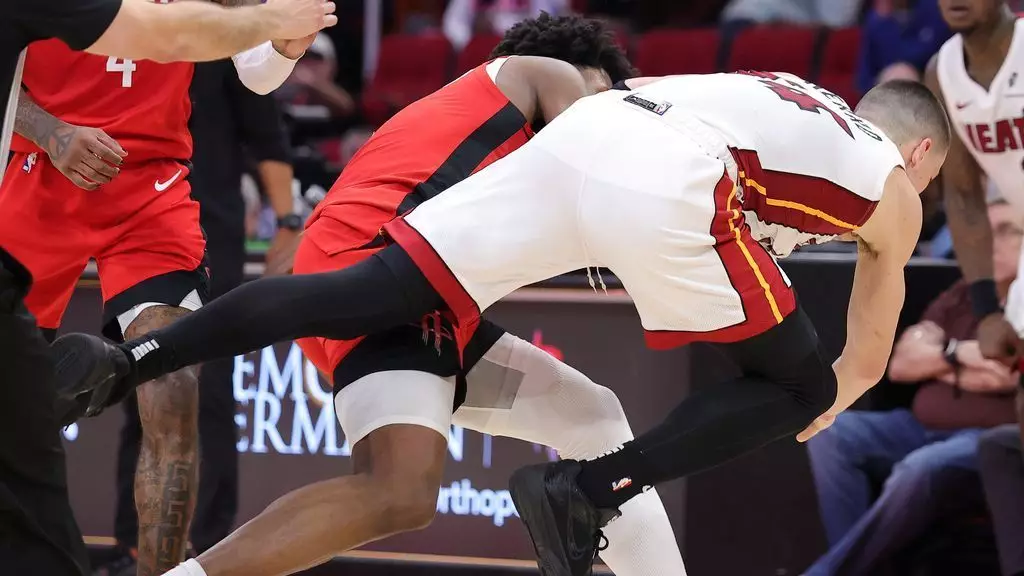The NBA is often characterized by its electric atmosphere, propulsive gameplay, and moments of tumultuous intensity. This was palpably demonstrated in a recent contest between the Miami Heat and the Houston Rockets, where tensions escalated to such an extent that six individuals were ejected late in the game. The pivotal moment arose near the end of Miami’s 104-100 victory, marking not just a compelling win but also a narrative steeped in conflict, highlighted by Amen Thompson’s aggressive encounter with Tyler Herro.
During the game, with Miami leading by five points and merely 35 seconds remaining, the Heat were poised to inbound the ball. In a moment of heated competition, Thompson pulled down Herro by the jersey, leading to a physical altercation that resulted in a swift and decisive response from officiating crews. Referee Marc Davis depicted the incident starkly, labeling Thompson’s actions as a “body slam.” This moment of fury not only showcased the competitive nature of both players but also unravelled a series of ejections that shocked spectators and players alike.
The ejections that followed involved not just players but also significant coaching staff, including Rockets coach Ime Udoka and Rockets assistant coach Ben Sullivan. The chaos that erupted on the court seemed to stem from a combination of competitive spirit and frustration. Herro, who had just put together an impressive performance of 27 points, nine assists, and six rebounds, remarked that Thompson’s aggression stemmed from the pressure of competition. He noted, “I guess that’s what happens when someone’s scoring… I’d get mad, too.” This insight suggests that competitive rivalry, often a driving force in the NBA, can at times cloud judgment and escalate into more aggressive confrontations.
While Herro and Thompson had not previously interacted outside of the game, this incident underscores how quickly on-court dynamics can shift from camaraderie to confrontation. It raises questions about athlete behaviors under pressure and the challenges faced when egos clash during high-stakes moments.
Interestingly, prior to this altercation, Houston had seen its own tumultuous moment with Fred VanVleet’s ejection due to an altercation with the referee. This sequence of events painted a larger picture of the high-pressure environment that both teams were navigating. This was not merely a reflection of individual tensions but indicative of a team struggling under the weight of expectations and competitive demands.
The victory for the Miami Heat, occurring just 24 hours after a loss to Atlanta, seemed to galvanize the team, especially with the absence of second-leading scorer Jimmy Butler. Herro’s performance was instrumental in sealing their win against a formidable Rockets squad, a feat he acknowledged with pride. “They’re top two, three in the West,” Herro mentioned regarding their opponents, illustrating the significance of Miami’s resilience in the face of adversity.
As teams move forward from such contentious moments, the aftermath and responses will be crucial. The NBA landscape demands not just athletic prowess but also emotional regulation among its players. The events that transpired during this game should serve as a reminder of the fine line athletes tread between intense competition and maintaining sporting decorum. As both teams refocus on their season, the lessons learned from this poignant encounter will undoubtedly play a role in shaping their future performances.

